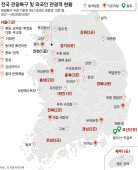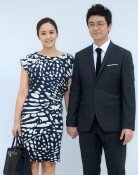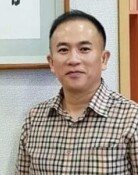President indifferent in politics
Once upon a time there was a boy who had a crush on a girl. The boy followed the girl everywhere she went at school. The girl, however, was in love with another boy. One day the poor boy finally had a chance when her boyfriend left her alone after squabbling with her in front of the library. Looking at the sobbing girls drooped shoulders with sadness, the boy mustered up the courage to approach her. "Your drooped shoulders bring pain to my breast," the boy repeated the sentence in his mind. What do you want? said the girl glaring at him. With his mind going blank, the boy said, Your drooped breasts bring pain to my shoulders.
The above is part of Shin Gyeong-suks novel Ill Be Right There. This episode emphasizes the importance of word order. The girl might have thought the boy was a pervert. Contrary to the boy, Korean politicians are masters of language in a sense.
Lee Hae-chan, a senior advisor for the main opposition Democratic Party who is said to have been experienced all political positions except the president, once blasted for the president calling her you. Lee later tried to avoid responsibility by saying, You is a respect form of the other party when the other party is absent. Lee seems to have a mastery of language befitting a longest-serving-six-term lawmaker. As a former MBC news anchor, Shin Gyeong-min, a member of the partys supreme council, admonished Lee to study the usages of the word you.
The abilities of language of the ruling and opposition parties clashed head-on over the interpretation of a record of the 2007 summit between Seoul and Pyongyang. Over the same minutes, one party became furious saying that the president gave up part of the countrys territory while the other party found nothing special with former Health and Welfare Minister Rhyu Si-min saying that the atmosphere was very pleasant (toward the end of the summit.) Rhyu denounced the ruling Saenuri Party for being interpretationally illiterate. This might not be totally ungrounded because the atmosphere could not be bad when a president of South Korea said he had worked like a representative of North Korea.
Reckless words in the political circle serve like a cartel of politicians that prohibits new faces from entering the circle. No sound-minded person would want to be part of this mess. This may be the reason why President Park tries to keep a distance from politics. The president, however, is at the zenith of politics. People learn about state affairs by watching political affairs because political issues always inundate media while government policies are relatively less exposed. However, President Park Geun-hye seems to talk about politics for only two types of occasions. One is when the president thinks she is unduly under fire, and the other is when she does not understand the key issue of a problem. It is nonsense that the new government should take responsibility for all matters, is an example of the former. An example of the latter can be found when the president commented on chronic deficit of local hospitals by saying, There can be a good deficit.
While the political circle was mired in the controversy surrounding presidential record over the past one month, the president sat on her hands on the matter. Now as underdogs, the both ruling and opposition parties came back to a negotiation table to talk about peoples livelihood. However, they can bring up the record issue again whenever they want. If this happens, the presidents lone effort to improve the economy and create jobs will not achieve anything without political support. Resource distribution according to priorities is a matter that requires political decision. The reason for the stagnant status of key tasks, including job creation, creative economy and deregulation of the service industry, is the separation between the government and the National Assembly.
President Park who always emphasizes preemptive measures could have been resolved beforehand the issue of the National Intelligence Services intervention in the political affairs by reproving the intelligence agency for political intervention and announcing measures to reform the agency. The president might have been able to offer comfort and ask for cooperation to the opposition parties before they came to feel too bitter about their lost in the presidential election to accept the defeat. While pushing forward with expensive projects even by spending every penny of the countrys budget, the president seems less interested in cheap agenda such as establishing the Grand National Unity Commission and Equal Opportunities Commission, and personnel appointment across political parties.
Winning an election and governing a country require different abilities. However, a person who achieved one goal may mistakenly think he or she can succeed in other tasks in the same way. This explains why all former presidents who won a landslide victory failed in governing.
Headline News
- N. Korea redefines S. Korea as ‘hostile state’ in revised constitution
- Samsung develops graphic DRAM with industry-leading capacity and speed
- Three questions allegedly leaked via text message during Yonsei Univ. essay test
- China to inject 340 trillion won in loans to support real estate sector
- Dodgers beat Mets to take 2-1 lead in NLCS







